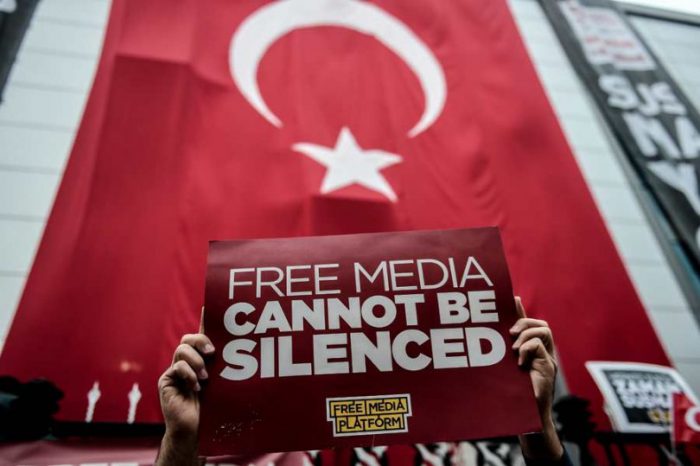The International Press Institute (IPI) in collaboration with Turkey’s Media and Law Studies Association (MLSA) on Wednesday published the third trial monitoring report on free speech in Turkey, indicating the failure of the country’s criminal justice system to observe the right to a fair trial especially in cases related to journalism and free speech.
The report is part of a program of monitoring that started in June 2018 and confirms the findings of the two earlier reports, published in July and January 2019.
The new report covers 42 hearings held in 38 cases involving 202 defendants, of whom 159 were journalists, that took place between June 1 and July 21, 2019.
An overwhelming 85 percent of hearings involved terrorism-related offenses, primarily spreading propaganda on behalf of terrorist groups or membership in terrorist groups.
Others included defamation-related charges such as insulting the president and humiliation of the Turkish nation.
Of the 157 journalist on trial, 34 were held in pre-trial detention, of whom 18 had been held behind bars for more than a year. Nine of them faced terrorism-related charges.
Evidence used to justify pre-trial detention and the terrorism-related charges consisted mainly of journalistic work, including published articles and photos, contacts with sources and posts on social media.
Loosely drafted anti-terrorism legislation enables the courts to conflate journalistic practice with terrorism propaganda and label journalists who have been engaged by a media organization perceived as aligned with the faith-based Gülen movement, or that is pro-Kurdish, as proof of membership in a terrorist group.
Turkey accuses the Gülen movement of masterminding a failed coup in 2016, although the movement denies any involvement. Pro-Kurdish media outlets and journalists are frequently accused of having ties to the Kurdistan Workers’ Party (PKK), which Turkey considers a terrorist group.
The report showed that in 13 percent of cases (five of 38) the presiding judge was replaced during the proceedings. This is down from 20 percent in the previous report but still underlines concerns about the arbitrary removal of judges. For example, in a case related to the 2013 Gezi Park protests the presiding judge was removed by the Council of Judges and Prosecutors (HSK) after the judge had expressed an opinion in favor of the defendants. Since 2017 the HSK is appointed directly by the president and parliament.
“Journalists continue to be held in detention on the most serious terrorist charges justified by evidence of their legitimate journalistic work. Their days in court are subjected to countless breaches of procedure denying the right to a fair trial in what amounts to a deliberate attempt to intimidate and silence critical voices,” Oliver Money-Kyre, IPI Turkey program manager, said.
A press freedom report by the Council of Europe recently named Turkey the world’s largest jailer of journalists.
The country was also ranked 157th out of 180 countries in the 2019 World Press Freedom Index published by Reporters Without Borders.



